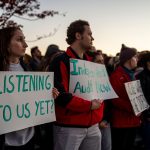Jennifer Doleac is an associate professor of economics at Texas A&M University and the director of the criminal justice-focused Justice Tech Lab. But this past week, she’s had a different job: acting as a “switchboard operator” for women in her field who have been harassed or assaulted by colleagues while doing their jobs.
It started over the weekend, when a number of women economists tweeted about alleged abuse and harassment they have experienced at the hands of men colleagues. It quickly grew, overwhelming #EconTwitter, as more and more women spoke about their own experiences with sexual harassment. Doleac — who has over 50,000 Twitter followers and the protection of tenure — encouraged people to contact her with her stories.
“Because I haven’t been a victim and I have this platform, I feel a responsibility to carry this torch. I feel like the least I can do is take a little bit of the load off of these women,” Doleac said. “I’m grateful that this many people are trusting me with their stories, emailing me with stories that they clearly haven’t told anyone in a really long time. It shows how long so many of these guys have been acting badly.”
The #MeToo movement hit the field of economics in 2018, as it did in many industries. On the heels of the initial wave of stories following the reporting on the decades of systemic abuse perpetuated by Hollywood mogul Harvey Weinstein, The New York Times broke a story about a star economist from Harvard, Roland Fryer, and his history of long-term sexual harassment. But as the past week’s tweets have shown, the story of #MeTooEcon is hardly over.
The December 2018 article on Fryer did help prompt a reckoning across economics, especially around complaints of sexual misconduct in which the perpetrator and victim are not associated with the same institution. In those situations, Title IX, the 1972 civil rights law that prohibits sex-based discrimination in education, including discrimination that takes the form of sexual misconduct, can fall short. Groups worked to respond: #MeToo in economics was discussed at the American Economics Association (AEA) annual meeting in January 2019, and the AEA moved to establish processes to handle complaints where the people are not at the same university.
But the AEA system has butted up against its own limitations. It’s a professional organization, so the kinds of disciplinary action it can take against the respondent in a sexual misconduct complaint are limited. The system, in theory, was designed to operate in the spaces where Title IX cannot, but in reality, said Doleac, it has no means of protecting the confidentiality of complainants, extremely limited investigative power, and no disciplinary muscle. In turn, this system has created a dynamic that many women in the field believe only further accommodates sexual misconduct: People who are accused can publicly state they were subjected to an investigation by their professional organization with no resulting action – and they would technically be correct because of the AEA’s limitations.
Which is why Twitter has entered the proverbial chat — and Doleac has volunteered herself to collect the accusations, fear and anger. Doleac is encouraging women economists to share their #MeToo stories with her, whether they’ve tweeted them or not. She’s connecting some women to others with similar stories. She’s directing others to attorneys and putting many in touch with journalists. At this point, Doleac said, she’s doing whatever she can to be a place where women can feel that their experiences are being heard — and then help set them on whatever path of action they feel comfortable pursuing at this time.
Laura Gee, an associate professor of economics at Tufts University and a member of the ethics committee of the Economic Science Association (ESA), has for years been working to get professional organizations for economists and universities to ask a set of vetting questions in hiring. She wants them to ask if a job candidate has had a formal complaint for misconduct or sexual harassment upheld against them, by an employer or other association or body; whether they’re under investigation at that time; and whether they pledge to comply with the ethical guidelines, including avoiding all forms of abuse and harassment.
The ESA began work on crafting these guidelines, including these vetting questions, in 2020, and the measure was formally adopted in July 2022. By Gee’s count, in addition to the ESA implementing these questions in hiring for its own journals and committee appointments, six universities have signed on to implement the “Don’t Hire a Harasser” policy at their own institution.
“I don’t think answering ‘yes’ to any one of these questions should automatically preclude you from being hired, but it’s a big way to ensure more transparency,” Gee said.
The field of economics is dominated by men, particularly White men. Only 34 percent of bachelor degrees and PhDs in economics are attained by those who identify as women — a statistic that has held steady for decades, Gee said. The numbers are even lower in academia, where only 15 percent of full professors and 22 percent of tenure-tracked professors identify as women.
“We have very few nonbinary folks, very few Black people, very few Hispanic people. I identify as mixed race — I’m half-Chinese and half-White — and I’m sure there are very few people who identify this way as well,” Gee said. “These are the people influencing policies in government and in criminal justice — and they are largely all from a specific demographic of people. Economists are largely the children of highly educated people who come from higher socioeconomic status who identify as male. I think that’s not who we want making all the ideas that govern our world.”
But efforts like those Gee has been involved in can be difficult to implement exactly because of some of the nuances that exist around Title IX, its limitations and the fear many schools feel about facing additional potential liability as a result of the law.
Title IX guarantees protection against sex discrimination in education — including sexual assault and harassment. Shiwali Patel, the director of justice for student survivors and senior counsel at the National Women’s Law Center, said reporting and accountability are more complicated when these behaviors take place outside of a university campus. Sexual misconduct at conferences can be subject to Title IX if it occurs during an educational program or activity. But, Patel said, it’s a gray area.
If someone has experienced sexual harassment or abuse in an education program or activity, a school is obligated under Title IX to provide them with supportive measures, from a leave of absence to counseling services. But if the perpetrator is at another institution, Title IX does not mandate any kind of investigation at either school.
Patel adds that under current Title IX rules, if institutions ask about past or ongoing active investigations under Title IX during the hiring process and find out that a candidate has a history of sexual misconduct, they could be liable if they hire that employee and the employee abuses someone on their campus. This threat of liability can perpetuate the code of silence that has allowed sexual misconduct to flourish in academia, Patel said.
“There is no liability in not asking about this under Title IX,” Patel said. “It is the right thing to do, but there is no obligation under Title IX.”
As the number of allegations brought by women in economics has spread, Misty Heggeness, a research economist at the U.S. Census Bureau and an associate professor at the University of Kansas School of Public Affairs and Administration, started a Change.org petition titled “Stop Predatory Behavior in the Economics Profession” calling for an open forum on predatory sexual behavior at the 2023 AEA meeting. Heggeness said the frustration that has led so many women in her field to feel like they have no other mechanism for prompting any accountability from institutions regarding sexual misconduct goes back further than just the past few years. There used to be a whisper network, where women would tell one another to steer clear of certain men.
Today, Heggeness said, “the younger generation of women in economics is saying, ‘No, that doesn’t work for us anymore.’ And they’re absolutely correct. You’re still vulnerable if you’re not a part of the whisper mill.”
Thinking about what this protection looks like is further complicated by the dynamics and structure of academia itself, wherein older, more established faculty wield a lot of power over younger students and non-tenured junior faculty. Those with less power need references and recommendations from those with credentials to apply and move up through graduate programs, get research funding, be published in journals and gain tenure.
“It creates a space ripe for harassment and abuse,” Heggeness said.
Doleac said a lot of the people, both men and women, who are sending her stories of sexual misconduct in economics have lost faith in these institutions.
“A lot of people who wouldn’t have reported something to the AEA or a school Title IX office are open to talking to journalists because they feel that’s the only way something may happen,” she said.
“This has been boiling and stewing under the surface for so long, and now a bunch of people who have been frustrated and angry are ready to talk. My inbox is completely out of control,” Doleac continued. “So many people say they are scared to come forward because they don’t have tenure — but everyone is talking.”






